Highlights
WHAT’S NEW
UB launches minor in social work
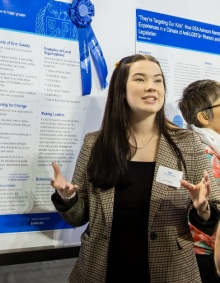
Jess Williams, a School of Social Work undergrad, presents on her civic engagement work. Photo: Meredith Forrest Kulwicki
Undergraduates can now explore the social work profession — and develop skills relevant for any career path — through the School of Social Work’s new Minor in Social Work program.
Open to students from any major, the 18-credit program is grounded in the school’s signature trauma-informed and human rights perspectives. Undergrads will receive an overview of the profession, explore how social systems impact individuals, communities and societies, and learn how social workers intervene to challenge injustice and help those in need.
Ultimately, students will develop their interpersonal, helping and policy analysis skills to prepare for graduate school or careers in a variety of fields.
“As society grapples with many urgent challenges, social work is more important than ever,” says Dean Keith A. Alford. “Through our new social work minor, students will see how they can use their skills in problem-solving, innovation and collaboration to serve others and uplift a population or community they care about.”
GOOD NEWS
CSWE honors UB PhD candidate
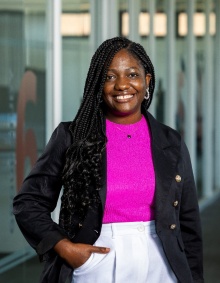
Ogechi Kalu. Photo: Meredith Forrest Kulwicki
Congratulations to PhD candidate Ogechi Kalu, who won two awards from the Council on Social Work Education (CSWE) this year. Kalu was named a 2025-2026 Doctoral Student Policy Fellow and accepted CSWE’s Community Partnership Action Award for Individuals this fall.
The policy fellowship will support Kalu’s research into how intimate partner violence affects children in her native Nigeria, with the goal of developing effective interventions and policy solutions. Through policy placement experiences and webinars on such topics as leadership and policy analysis, she will learn from experts and other fellows and develop policy briefs based on her research.
“My personal experiences ignited my passion for policy and advocacy,” Kalu says. “With this opportunity, I’ll learn how to translate my research into policy and actionable steps.”
On top of the CSWE honors, Kalu earned two more awards last spring: a Margaret McNamara Education Grant and the Cenie “Jomo” Williams Tuition Scholarship from the National Association of Black Social Workers.
3 QUESTIONS ABOUT
Library social work
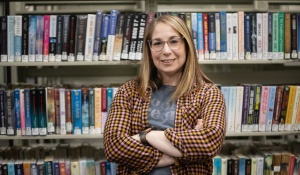
Leah Topek-Walker at Patchogue-Medford Library. Photo: Brenda Percy
After working in community mental health early on, Leah Topek-Walker, LCSW-R, DSW ’25, became fascinated by the intersection of libraries and social work. Now, as a clinical associate professor and practicum education coordinator at Stony Brook University, she and another supervisor run a library-based program for almost 20 student interns per year.
What is a library social worker?
LTW: Library social workers are placed within libraries; the model works with both the individual and the community. Libraries are fundamentally about judgment-free spaces where people can get what they need, where they feel safe and can have access. So library social work ties into the social work principles of trauma-informed care and anti-oppressive practices.
What do library social workers do?
LTW: Every library and library system is different. One aspect of the job is talking with librarians about how the library is accessible and how their policies might impact their communities.
Library social workers also connect with community agencies, food pantries and other players. In our current context, people are experiencing fragmentation and chaos within our government and social service systems. Library social workers can provide lifesaving and life-changing information, such as connecting people to housing and health insurance so they can access care.
What’s the future of library social work?
LTW: Librarians are on the front lines of many of our crises. It’s exciting for social work to be part of the conversation about how we’re both taking care of these spaces and the people who work in them. Having support and working to bring our professions together is really powerful. Library social work is transformative
ON THE PODCAST
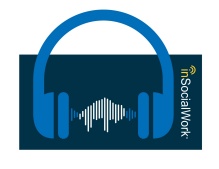
Building bridges, not walls
“Migration is not a crime; it’s actually a natural, fundamental part of human existence.”
— Laurie Cook Heffron, PhD, LMSW, associate professor and social work program director at St. Edward’s University in Austin, Texas, during a conversation about how social workers can respond to anti-immigrant policies.
BIG PICTURE
UBSSW at the UN
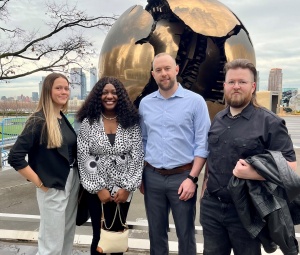
From left, Emma McCarthy, Ogechi Kalu, Michael Lynch and Christian Jepson outside U.N. Headquarters in New York.
School of Social Work students saw how to address social justice issues on a global scale when they attended Social Work Day at the United Nations.
Alongside Clinical Associate Professor Michael Lynch, they heard from international leaders, learned about career paths outside the U.S. and participated in a separate half-day conference at Fordham University, with sessions on community advocacy, climate justice and artificial intelligence.
“Overall, this experience expanded my perspective on what social work can be and how the levels of social work practice are interconnected,” says Emma McCarthy, an online MSW student. “I left with a clearer vision of the kind of social worker I want to become.”
COMMUNITY CONNECTIONS
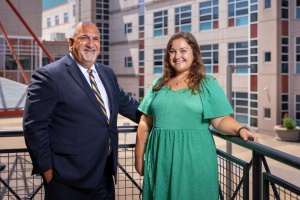
Mark Laurrie and Megan Koury at Niagara Falls High School. Photo: Douglas Levere
Creating trauma-informed champions
The School of Social Work’s Institute on Trauma and Trauma-Informed Care (ITTIC) and the Niagara Falls City School District are working together to build a new kind of champion.
The Niagara Falls High School Champion Team is a group of specially trained students within this pioneering collaboration to teach trauma-informed practices throughout the district. The partnership, which began in 2020, recently got a boost when the Buffalo Bills Foundation awarded the district a $10,000 Social Justice Grant.
With ITTIC’s support, the district has educated teachers, administrators and staff on trauma-informed care. Then, Superintendent Mark Laurrie says, they decided to “take the program to another level” by training student champions.
“There are empowerment groups and after-school programs, but adding the trauma-informed piece to a student’s curriculum is a concept we were able to create thanks to the superintendent’s support,” says Megan Koury, project manager and trainer at ITTIC. “It’s really a first.”
Champions identify concerns that can be communicated to someone who can direct students to available resources, if necessary. The program is the first of its kind nationally, according to Koury — and the response has been overwhelming.
“I hear it repeatedly from students interested in becoming a champion,” Koury says. “They tell me, ‘I see the world around me and I want it to be better.’”